Politics
Azerbaijan marks Independence Day | Daily Sabah
May 28 is the anniversary of Azerbaijan’s first independent state in the 20th century, declared in 1918. Although short-lived, it represents the resilience of the country for sovereignty and is observed as Independence Day.
The Azerbaijani Democratic Republic, or the Azerbaijan People’s Republic, was declared on May 28, 1918, by the Azerbaijani National Council. It lasted only for 23 months, but throughout this period, it embarked on ambitious reforms, from freedoms in the economy, education, religion and conscience, providing equal rights to all citizens. Indeed, Azerbaijan was among the first countries in the East to provide women’s suffrage. The republic also stood out as a beacon of Turkish presence in the region, declaring Turkish as the state’s language and making the language mandatory in middle schools.
After the collapse of the Russian Empire following World War I, new political structures emerged in the Caucasus region. On May 28, 1918, the Azerbaijani people exercised their right to self-determination and declared independence.
The Azerbaijan Democratic Republic, proclaimed by the Azerbaijani National Council in Tbilisi of modern-day Georgia, became the first republic based on popular sovereignty in the Caucasus and the Turkic world.
The republic not only declared independence but also quickly established the foundational elements of a modern state. A parliamentary system was created, introducing a multiparty political system. Comprehensive reforms were launched in law, education, foreign policy and the military. One of the most notable steps was granting women the right to vote and be elected. This made Azerbaijan the first Muslim-majority country to grant women political rights.
Due to the occupation of Baku by Armenian and Bolshevik forces, the Azerbaijani government operated for a time in Ganja, the country’s second-largest city. The Ottoman Empire was the first state to recognize Azerbaijan’s independence, signing an agreement on June 4, 1918. As part of this, then-Minister of War Enver Pasha formed an army under the command of his brother, Nuri Pasha (Killigil), to assist Azerbaijan. Known as the “Caucasus Islamic Army,” this force liberated Baku on Sept. 15, 1918, allowing the government to relocate there. The army suffered 1,130 casualties during the battles to reclaim Baku.
Azerbaijan quickly implemented reforms in the economy, education, and freedom of religion and conscience, setting historic precedents. Equal rights were granted to all citizens regardless of race, religion, sect or gender.
It became the first Muslim-majority country in the East to grant women suffrage. The republic introduced its own currency and postage stamps and established the State Bank and Baku State University.
To defend against external threats, Azerbaijan formed its own army on June 26, 1918, with significant involvement from Ottoman officers.
On June 27, 1918, the government declared Turkish the official state language. Turkish-language instruction became mandatory in secondary schools, which had previously been taught primarily in Russian.
On Dec. 7, 1918, the 120-seat parliament began its sessions. Representing all political parties and ethnic groups, the parliament passed 230 bills during its 17 months of activity.
The Azerbaijan Democratic Republic lasted only 23 months. Soviet forces entered Baku on April 28, 1920, ending the republic’s existence and beginning Soviet occupation. However, the reforms and ideals established during this brief period deeply influenced Azerbaijan’s political identity and left a lasting legacy.
Mehmed Emin Resulzade, recognized as the founder of Azerbaijan, famously said, “The flag once raised will never fall.” This phrase became a rallying cry for Azerbaijanis years later.
After the Soviet occupation, many government officials and intellectuals fled the country but continued to champion Azerbaijan’s cause throughout their lives.
Following the collapse of the Soviet Union, Azerbaijan declared independence again, recognizing itself as the successor state to the Azerbaijan Democratic Republic of 1918-1920.
Politics
Turkish army joins biggest NATO exercise with 2,000 personnel
NATO stages its biggest exercise this year in Germany, with some 10,000 personnel from 11 countries. Türkiye, which has the defense body’s second-largest army, dispatched 2,000 personnel for Steadfast Dart 2026, which began on Sunday. The exercise, which will continue until Feb. 20, aims to showcase NATO’s ability to deploy rapidly and conduct complex operations, the body said in a statement earlier this month.
It is the first time that Türkiye sent so many troops to Northern Europe, though the country is a major component of NATO at a time of heightened defense worries in Europe.
Türkiye aims to demonstrate its locally made weapons systems at the exercise in Germany. The country plays a strategic role in the Allied Reaction Force (ARF) that will test NATO’s readiness in a simulated conflict scenario.
The 66th Mechanized Infantry Brigade Command of the Turkish army will be among those representing the country at the exercise. Soldiers from the command’s base in northwestern Türkiye’s Tekirdağ province left for Germany on Saturday after a ceremony. Speaking there, the brigade’s commander, Brig. Gen. Hulusi Koçbay, said that the exercise would involve simultaneous use of land, air and naval vehicles and that they had contributed 650 personnel and 149 vehicles to the exercise, pointing out that they would use locally produced weapons and equipment. He said the TCG Anadolu vessel of the navy and a civilian transportation ship left Türkiye on Jan. 20 for the deployment of vehicles and munitions and already arrived at Germany’s Emden port.
“We will conduct joint training with other countries in several fields for combat and improve our cooperation abilities within NATO. We are ready to conduct any tasks we are assigned to demonstrate efficiency and visibility of our Land Forces in NATO,” he said. The combat group consists of a motorized infantry battalion, an artillery battery, an engineer combat company, a maintenance unit and a field service company.
Türkiye played a critical role in the Western-centric bloc, which expanded its influence across Europe. Commanding one of the strongest armies in the alliance, the country is also a key member of NATO due to its location on the southeastern tip of Europe, at the gateway to Asia for Europe.
Although it has started courting NATO’s traditional rivals more in recent years, Türkiye is firmly aligned with the alliance, as its leaders repeatedly confirmed. Türkiye’s membership is viewed as winning a reliable ally in NATO’s southern wing in terms of air, land and maritime defense. The country is already in the top five countries contributing to NATO’s operations and missions.
Türkiye’s strategic location makes it the first defense against threats and risks in the region for NATO, while the alliance is an essential component in Türkiye’s security and defense. The country particularly proved its worth to the alliance, which sees terrorism as one of the main threats.
In the Balkans, Türkiye is the top contributor to the alliance’s Kosovo Force (KFOR), which maintained command of the forces between 2023 and 2024. It currently holds deputy command of the force, while it was the top contributor to the reserve battalion in Kosovo to ensure the security of the Balkan country and the region.
It is also a top contributor in terms of personnel to NATO’s Iraq mission, which was founded in 2018 to provide consultancy and training to Iraqi security forces.
In NATO’s military exercises, Türkiye is a prominent actor. It also commands NATO’s permanent maritime task group and a task group against naval mines.
The country provides financial and personnel support to NATO, primarily for building defense capacity. In 2024, it became one of 24 NATO members achieving a 2.09% goal in the proportion of estimated defense expenditures to gross domestic product (GDP). Türkiye ranks eighth among the top contributors to NATO in contributing to joint funds, at 4.59%, and seventh in terms of personnel contribution to the alliance’s entire cadres.
Türkiye also hosts critical NATO facilities, including Allied Land Command, which is located in the western city of Izmir, and Rapid Deployable Corps, which is based in Istanbul. In the capital, Ankara, it hosts the Centre of Excellence for Defence Against Terrorism (COE-DAT) and the Partnership for Peace Training Center. Istanbul hosts the NATO Maritime Security Centre of Excellence (MARSEC COE).
The country’s rapidly growing defense industry makes it a valuable member of the alliance in terms of innovation and production in the industry. This has become especially prominent in light of the ongoing conflict in Ukraine and the beginning of the second Trump era in the U.S., bringing the “strong defense industry” element to the forefront of the alliance’s agenda. In addition to being NATO’s second-largest army, Türkiye has solidified its privileged position in recent years with advancements in its defense industry, producing a wide range of military products and equipment.
Its innovative defense industry has gained significant attention from both NATO and allied countries. The use of Turkish-made drones by Ukraine has underscored this.
Politics
Türkiye’s MHP celebrates 57th anniversary
Government ally Nationalist Movement Party (MHP) will mark its 57th anniversary on Monday. Party Chair Devlet Bahçeli will convene fellow members at a major event in Ankara on the occasion of the anniversary.
The MHP was founded in 1969, or rather, changed its name from the Republican Villager Nation Party (CKMP) in a convention that year. The CKMP was founded by Alparslan Türkeş, a military officer who fell out with the junta regime that seized power in 1960. The party held a two-day convention on Feb. 8-9, 1969, that concluded with the name change and adoption of three crescents as its emblem. It is the longest-surviving nationalist party in Turkish politics.
Four years after the name change, the party secured two seats in the government founded in 1973. It further expanded its clout by securing 16 seats at the Parliament in the 1977 elections and joining the coalition government led by Prime Minister Süleyman Demirel.
The MHP shared the fate of other parties after the 1980 coup and was shut down while its leader, Alparslan Türkeş, was banned from politics. As other parties did, it went on to change its name again, this time to the Nationalist Workers Party (MÇP) in 1985. The party switched back to the MHP name in 1993, four years before the passing of Türkeş. The incumbent chair, Devlet Bahçeli, defeated Türkeş’s son Tuğrul in the 1997 intraparty elections and has served in this capacity since then. Under Bahçeli, the MHP increased its votes and became the second party after the Democratic Left Party (DSP) in the 1999 elections, leading to a coalition government between the DSP, MHP and Motherland Party (ANAP). The party’s votes, however, skydived in the 2002 elections, where it failed to win any seats in Parliament. It was only in 2007 that it returned to Parliament with 71 seats. Since then, it gradually increased the number of seats with successive electoral victories.
2015 was another breaking point for the MHP, after the death of Türkeş. Three prominent figures of the party sought “change” after the 2015 elections and challenged Bahçeli to a new intraparty election. Bahçeli rejected the bid, paving the way for a split. Bahçeli’s opponents in the party, led by Meral Akşener, went on to found the Good Party (IP).
Initially wary of the ruling Justice and Development Party (AK Party), the MHP decided to side with them after the July 15, 2016 coup attempt by the Gülenist Terror Group (FETÖ) sought to topple the AK Party government. Bahçeli openly supported the executive presidency system for Türkiye and constitutional changes stipulated in a referendum proposed by the AK Party. The MHP’s support for AK Party chair and President Recep Tayyip Erdoğan took another turn when it agreed to form the People’s Alliance with the AK Party in the 2018 elections. The party’s votes declined after the formation of the alliance but it managed to secure 10.07% of the vote in the 2023 general elections. Currently, the MHP retains 47 seats at Parliament.
Politics
Aktaş arraigned for corruption plaguing cities run by Türkiye’s CHP
Aziz İhsan Aktaş, a prominent businessperson accused of running a criminal ring thriving on briberies to municipalities run by the main opposition Republican People’s Party (CHP) will make his first court appearance this week.
He is among 200 defendants on a case that shed light on bribes and tender-rigging processes in municipalities that also netted prominent mayors of the CHP. Aktaş was released and sentenced to house arrest last year after his initial arrest in 2024, when he decided to collaborate with authorities. In January, the first hearing of defendants in the case was held in Istanbul. An indictment says Aktaş and his associates bribed their way into lucrative tenders and building permits. Several CHP mayors in Istanbul, including Beşiktaş’ Rıza Akpolat, Avcılar District Mayor Utku Caner Çaykara, as well as mayors of southern city of Adana and southeastern city of Adıyaman were also named in the indictment. The latter two were released before the trial began.
An Istanbul court heard testimonies of 33 defendants so far in the previous hearings. Among them were Akpolat who faces prison terms up to 337 years on charges of corruption.
Aktaş faces prison terms up to 450 years for his role as the “leader of the criminal ring” as prosecutors defined him.
The arrests of Aktaş and Akpolat were first in a long line of investigations into alleged rampant corruption in CHP-run municipalities. In March 2025, Istanbul Mayor Ekrem Imamoğlu, a prominent figure in the party, was arrested on the same charges. More arrests followed on similar charges in the following months as investigations also expanded to other cities run by the CHP, such as Antalya in the south. The CHP claims the arrests are politically motivated and regularly holds public rallies to denounce them and call for release of mayors. The government insists that the judiciary is independent.
Prosecutors say Imamoğlu’s win in the 2024 election, where he secured a second term as Istanbul mayor, helped Aktaş’s criminal network to enter “into a golden age” of their corruption web. They say the network secured public tenders from the IBB and district municipalities of Türkiye’s most populated city since 2020, including Beşiktaş, Avcılar and Esenyurt municipalities.
Politics
Mayor quits Türkiye’s CHP after chairperson’s insults
Mesut Özarslan, mayor of Ankara’s Keçiören district for the main opposition Republican People’s Party (CHP), announced his resignation from the party on Sunday evening, after disclosing that the party’s chair, Özgür Özel, sent him derogatory messages.
Özarslan, elected to office in the 2024 municipal elections, was long rumored to join the ruling Justice and Development Party (AK Party). His meeting with Environment, Urban Planning and Climate Change Minister Murat Kurum further triggered the rumors. Özarslan disclosed that it was his meeting with Kurum that led to a defamation campaign by “some cliques” within the CHP against him.
In a lengthy social media post on Sunday, Özarslan said it was common for him to meet government officials to find solutions to Keçiören’s issues, but his Jan. 6 meeting with Kurum fueled “gossip by certain cliques in the party.” “I tried to remain silent in the face of pressure, rumors and defamation, but CHP chair, Mr. Özgür Özel, started sending me WhatsApp messages on Saturday, at 23:59. His messages contained insults, threats and slander contradicting political etiquette and humanity. Does a party chair insult a mayor and his family? Does a party chair have the right to insult by using swear words? I cannot continue serving in the CHP in the face of messages where even my parents are sworn at. I believe I cannot serve as a mayor (for CHP) in the face of those messages. I am not reacting against CHP, its voters. I am reacting only against the current administration, which has lost political etiquette,” he wrote.
“We were committed to serving people when we were nominated and elected, committed to walk together on this path to gain the favor of people and Allah. But at this point, I don’t see that either Özel or his colleagues have any sacred values. I call upon all my friends (in the CHP) to save themselves from this network of immoral people,” he added.
Along with Özarslan, seven members of the Keçiören municipal assembly resigned from the CHP on Sunday, while Deputy Mayor Emir Can Tunç and acting Mayor Tolga Turgut announced their resignation from the post and said they would remain in the CHP.
Several media outlets published unconfirmed screenshots of messages Özel sent to Özarslan, including ones where he called the mayor “b**tard.” Özel, quoted by pro-CHP Halk TV, denied using swear words in the messages, though he acknowledged that he wrote “harsh words.”
Özarslan quit the Good Party (IP) in 2023 and joined the CHP, working alongside Ankara Mayor Mansur Yavaş, a former nationalist politician. He is the first CHP mayor this year so far to quit the party, which boosted its vote in the 2024 municipal elections. Last year, Özlem Çerçioğlu, mayor of Aydın province in western Türkiye, resigned from the CHP and joined the AK Party, though she faced a barrage of slander on social media by CHP supporters and was repeatedly targeted in Özel’s speeches.
Politics
Türkiye’s MIT finds foreign intel ties in Imamoğlu espionage case
Türkiye’s National Intelligence Organization (MIT) has documented alleged links between a key suspect in a political espionage investigation and multiple foreign intelligence figures, according to indictment materials seen by prosecutors.
The investigation centers on former Istanbul Mayor Ekrem Imamoğlu, who is accused in an indictment of ordering an election-related data operation in which the personal information of millions of citizens was allegedly copied. Prosecutors say the operation was carried out by Hüseyin Gün, a businessperson now described by authorities as operating under the cover of private-sector activity.
According to Sabah newspaper, two intelligence reports prepared by MIT were included in the indictment, prosecutors said. The reports’ findings were said to match evidence independently obtained by police during the investigation.
According to the first report, Gün maintained ties with Christopher Paul McGrath, a former intelligence official who later moved into the private sector. McGrath previously served in the United Kingdom’s technical intelligence community and later held senior roles in maritime technology and risk intelligence firms, the report said.
MIT assessed that McGrath had served in managerial roles connected to information collection under the direction of Britain’s signals intelligence service, GCHQ.
The report also said McGrath later acted as a consultant for a Switzerland and Türkiye-linked cybersecurity firm beginning in May 2024, but announced his departure shortly after his name appeared in the Turkish investigation.
A second MIT report focused on individuals listed in Gün’s mobile phone contacts, identifying 10 figures described as “critical” and conducting detailed background analysis on each.
According to the report, other individuals listed among Gün’s contacts included Christopher Charles James Sturgess, described as a former senior figure within the United Kingdom’s GCHQ, who currently serves as chief technology officer at the London-based firm Clearwater Dynamics.
The report also cited Martin Howard, who held the post of director for cyber policy and international relations at GCHQ between 2011 and 2014 and later served as deputy head of defense intelligence at the U.K.’s Ministry of Defense.
Another individual named was David John Charters, identified as a member of Britain’s foreign intelligence service, MI6, and described in Gün’s phone contacts as “a close friend of former MI6 chief Richard Moore.”
Additional names included David Frank Richmond, a former director general for defense and intelligence at the British Foreign Office; Joseph Charles French, who headed defense intelligence at the Ministry of Defense from 2000 to 2003; former British special forces commander John Taylor Holmes; Brian Scott, who has worked with U.S.-based intelligence firms Patriot Defense Group and The Ascendancy Group; Fiona Hill, a former analyst at the U.S. National Intelligence Council who served as a deputy assistant to then-President Donald Trump between 2017 and 2019; and David Meidan, a former deputy head responsible for foreign relations and operational cooperation at Israel’s intelligence agency, Mossad.
Espionage disguised as business
The prosecutor’s office concluded that Gün operated “under the appearance of a businessman” while acting as an intelligence asset, a finding it said was supported by both intelligence and police assessments.
In earlier testimony, Gün told investigators that he owned a company named Piiq and claimed to have partnered with Aaron Barr, whom he described as a former CIA officer.
Gün’s arrest last July triggered a new probe into the activities of Imamoğlu, who already faces several lawsuits, ranging from forging his university diploma and insulting public officials to rampant corruption in the Istanbul Metropolitan Municipality (IBB), where he and dozens of other suspects are accused of enriching themselves through bribes and rigging public tenders.
Politics
Turkish lawmakers join forces to curb violence by minors
Juvenile crime, crimes committed by minors, have troubled Türkiye in recent years, especially after well-publicized cases and online outrage. Underage people are often exploited by gangs to carry out hits, while the murder of children by their peers adds another layer of concern to the issue.
The Turkish Parliament set up a “Committee for Research on Children Driven to Crime,” and its members explained their work and suggestions to Anadolu Agency (AA) on Sunday.
Şebnem Bursalı, a lawmaker for the ruling Justice and Development Party (AK Party), recalled the recent murder of Atlas Çağlayan and how it left “a deep wound in public conscience.”
“This wound can only be healed by taking responsibility, pinpointing any negligence and finding permanent solutions. We are committed to such solutions,” she said. Seventeen-year-old Çağlayan was stabbed to death by a 15-year-old boy in Istanbul on Jan. 14 after a dispute.
Bursalı said such violent crimes involving children cannot be treated solely as criminal cases. She noted that children reached that point after a chain of negligence, spanning from family and education to digital environment and “reality on the street.” “We cannot overlook this; otherwise, it will be turning a blind eye to new tragedies,” she said.
“The need to update preventive social policies, the proliferation of unregulated digital content, the rise in violent rhetoric on the streets, and the failure to adequately protect children must all be addressed as part of the background to this murder,” she said.
Bursalı noted that the committee will present an effective, deterrent and preventive road map that treats children pushed into crime not as criminals but as individuals who must be protected and rehabilitated, while also prioritizing public safety and a sense of justice. “I would especially like to emphasize that our president is closely following the issue and has instructed the relevant institutions to take all necessary measures to prevent similar incidents from occurring. As the AK Party, we are striving to voice and put into practice his determined stance on every platform. We will follow this process through to the end under the roof of Parliament to ensure that similar tragedies are not repeated.”
Sibel Suiçmez, a lawmaker from the main opposition Republican People’s Party (CHP), noted that the committee was formed after the murder of 15-year-old Mattia Ahmet Minguzzi last year in Istanbul. “Unfortunately, the murder of Atlas Çağlayan followed it. The rise in the actions of children driven into crime, changes in their actions make this a worrying trend and something we have to tackle comprehensively,” she said.
Suiçmez said that they had to act in a calm manner and base their work on scientific data. “We should both address people’s safety concerns and delve into the root causes of the problem.”
“It is not correct to tie these only to children, their families, education and the judiciary system. In fact, they are all interconnected. This is something that should be tackled by several ministries, and a solution mechanism should involve harmony between different ministries,” she said.
Divisions and impunity
Suiçmez noted that the issue was divisive as well. “We see social media campaigns and prejudiced people handing out their ‘verdicts,’” she lamented. “We have to come up with a solution appropriate to our judicial system,” she said. Suiçmez cited surveys highlighting that increasing sentences did not prevent new crimes. “Of course, the children should be held accountable for crimes they committed, but this issue should not be confined merely to sentencing. Children are born innocent, and we have to discuss everything that brought them to that level, from their family, the place where he/she raised, whether they had equal access to education and whether they had sufficient support from the state,” she underlined.
She said violence was on the rise across the world and the number of minors driven to crime also increased, adding that digital platforms played a role in promoting crimes. “Türkiye has sufficient sentencing for such crimes, though public perception is different,” she stressed.
“In recent years, sentences have been significantly increased, particularly for crimes such as violence against women and the abuse of children, but the problem is not the severity of the punishment. The problem is that the sentences imposed are effectively reduced in their execution through changes to enforcement laws. If sentences handed down not only to children pushed into crime but also in other offenses are served consistently and as required, the public perception of impunity would be dismantled,” she said.
She added that while authorities call for harsher penalties and longer detention to prevent children from being drawn into crime, at the same time, releasing individuals whose convictions are final under criminal law early by amending the Law on the Execution of Sentences creates, rightly or wrongly, a perception of impunity in society. “That is why everyone must be sincere. In Türkiye, there is no deficiency in criminal law or in the sentences themselves; the problem lies in their implementation,” she said.
Suiçmez said the number of children driven into crime could be reduced despite economic difficulties through stronger coordination among institutions, an increase in the number of social workers and psychologists, the provision of sufficient police forces and proper working conditions for them, and training for judges, prosecutors and police officers on the juvenile justice system.
The number of incidents involving children reported to or brought before security units in Türkiye rose significantly in 2024, reaching 612,651, an increase of 9.8% compared to the previous year, according to data released by the Turkish Statistical Institute (TurkStat) last year.
The statistics reveal a broad picture of the reasons children interact with law enforcement across the country. Of the total cases, 279,620 children were identified as victims, while 202,785 were involved due to alleged criminal behavior, categorized as “children driven to crime.” Additionally, 96,438 children were questioned for informational purposes, 18,561 were reported missing and later found, 8,729 were involved in minor offenses, and 6,518 came to security units for other reasons not otherwise classified.
Among the children driven to crime, 40.4% were involved in assault-related incidents, 16.6% in theft and 8.2% in drug-related offenses, including use, sale or purchase of illegal substances. Other allegations included threats 4.6%, crimes creating general danger 4.2% and a wide array of other offenses accounting for 26% of the total.
Children who were victims represented 45.6% of the total number of cases. Of the 279,620 victimized children, 86.1% were victims of criminal acts, while the remaining 13.8% were involved in incidents requiring official follow-up but not necessarily categorized as crimes.
The most common offenses among child victims were assaults at 55.3%, followed by sexual crimes, 10.8%, human trafficking and migrant smuggling, 9.5%, family-related crimes at 8%, and other offenses, 16.5%.
Naci Şanlıtürk, member of the parliamentary committee for the Nationalist Movement Party (MHP), says the public was angered on sentence reduction for offenders below the age of 18. “If someone is aware that they committed a murder, even if he or she is below the age of 18, they should be tried on the same laws applying to adults,” he said.
Şanlıtürk pointed out different aspects of crimes committed by children. “We see bullying, football ultras forming criminal networks, we see sentence reductions serve as an incentive for children into crimes. On the other side, films and video games promote violence. We have to review those,” he said. Şanlıtürk says the family plays a central role in the life of a child, and they should reinforce laws to strengthen family bonds. He said their suggestions focused on mothers, such as paying monthly allowances to mothers-to-be without any social protection and payment of minimum wage for unemployed mothers of three.
Drawing attention to scenes of violence in television series and films, Şanlıtürk said movies and mafia-themed series must be closely scrutinized. “Films that glorify violence should be reviewed and not broadcast. When you look at the content of games, children sometimes do not even realize that what they are doing is a crime. They see it in society, on the internet, in films and in games. A comprehensive effort is needed to prevent this,” he said.
Emphasizing the need to stop criminal networks from exploiting children, Şanlıtürk said. “We must prevent criminal gangs from laying their hands on our children, we must break those hands. It is wrong to lure 15- and 16-year-olds into crime with money on the assumption that there will be sentence reductions. There is also strong public sensitivity on this issue,” he added.
-
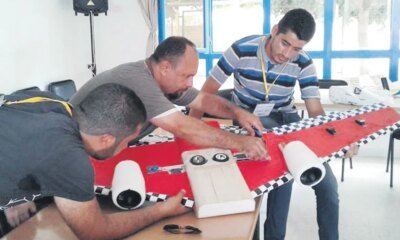
 Daily Agenda2 days ago
Daily Agenda2 days agoHistorical blow from MİT to Mossad: Trade-masked assassination network collapsed
-
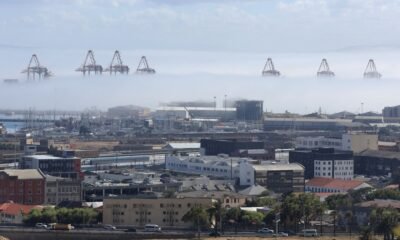
 Economy21 hours ago
Economy21 hours agoFacing US tariffs, South Africa steps toward trade deal with China
-
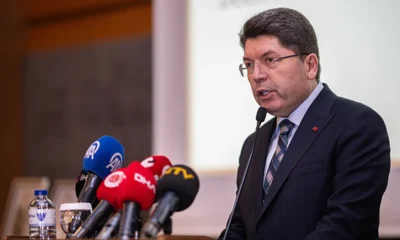
 Daily Agenda22 hours ago
Daily Agenda22 hours agoMinister of Justice Tunç: “The regulation regarding children involved in crime will come to the parliament after the commission works are completed.”
-

 Sports22 hours ago
Sports22 hours agoTurkish center Alperen Şengün named in 2026 NBA All-Star
-

 Sports8 hours ago
Sports8 hours agoAkar carries Türkiye’s hopes into Olympic short track spotlight
-
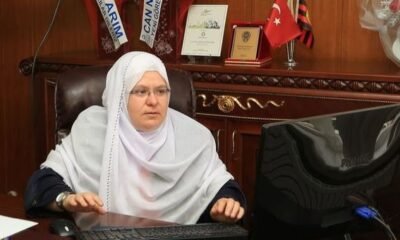
 Politics7 hours ago
Politics7 hours agoArrest, outrage after far-right man targets Turkish mayor’s dress
-
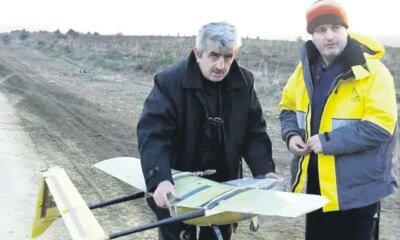
 Daily Agenda2 days ago
Daily Agenda2 days agoA Akıncı passed from this world
-

 Daily Agenda12 hours ago
Daily Agenda12 hours agoImmoral and excessive attack on women




